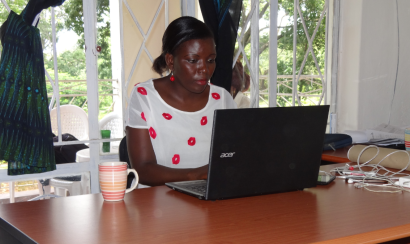In My Own Words: Agnes Niyonsenga
Agnes Niyonsenga’s humor and easy laugh may be her most recognizable traits, but her hard work, determination, love for systems, and kindness for humanity reveal themselves quickly, too. Joining One Acre Fund in 2014, Agnes, now our Tech Service Desk Lead, has been instrumental in helping us set up systems that are the building blocks to staff and customer satisfaction.

How would you describe what you do to a four-year-old?
(Laughs) My son, Angelo, is actually four! He is a gamer, and we got him a phone for his games because he was constantly downloading new games on our devices. As is common with electronics, he often has technical issues and brings them to me to sort out. Sometimes, solving the problem is as easy as restoring the internet connection or restarting the device. As One Acre Fund’s Tech Service Desk Lead, my team and I receive service requests for help from staffers — we try to understand the problem and troubleshoot. When the problem persists, we bring in an expert to help. This is the analogy I would use.
Why did you choose to work in the agricultural space?
My passion for service made me appreciate the development space, and I actively sought opportunities there. Additionally, my mother is a farmer, and agriculture has been a part of my upbringing. I have always been amazed by the science behind fertilizers — and how it makes crops grow faster. When I saw One Acre Fund’s job advertisement, I researched the organization and was happy to learn that its mission aligned with my purpose — service to people and communities, so I applied, and here I am.
What do you enjoy about working at One Acre Fund?
I have been at One Acre Fund for eight years now, and one of the reasons I have stayed is because of the learning opportunities provided to staff. Our roles are constantly changing, and I am glad we have access to mentors and coaches who push us and help us grow in our careers. I always thought my career would be in finance, but I am happy that I stumbled into a new opportunity that made me find my love for systems.
One Acre Fund’s work culture prioritizes humility; this is how we treat our clients and each other. Small acts of kindness significantly impact people — something as simple as my manager being genuinely concerned about how I am doing and prioritizing my work sustainability makes me feel appreciated and cared for.
Why is tech important to you?
It is simple — tech makes life easier and communication faster! When I first joined the organization, I was part of the Logistics team, and we did everything on paper. I managed the data from our warehouses — each of our eight warehouses would manually send in roughly 100 documents daily. As you can imagine, we had to wait long periods to receive the data, and syncing the data involved a lot of manual work. I proposed to my then-manager to get the team smartphones, enabling them to scan and send me documents in real-time. This system made our job more manageable and saved time and resources. Working in a space that allows me to keep making processes easier and more efficient makes me come alive.
How does tech catalyze the work we are doing for farmers?
Technology offers various tools to collect agricultural data and use that data to advise farmers on how to boost their yields. At the same time, it enables us to provide those services more conveniently. For example, a field officer can key in a farmer’s order information, and in a matter of minutes, this data will be available organization-wide. Our sourcing teams can then plan on what qualities to order and push for the best prices for our farmers. Technology has allowed us to communicate faster with farmers — we provide farmers with information on the best varieties, weather patterns, crop production techniques, and improved agronomic practices. Additionally, with tech, we attend to our team’s challenges faster and more effectively so that they may focus their time and energy on working for our farmers.
How do you create a work-life balance for yourself?
I have learned to say no. Work is an ongoing process, and there will always be more to do. At the beginning of my career, I often bit more than I could chew, which overwhelmed me. I have learned to prioritize my work and work with timelines that do not strain my personal time — I now know that it is okay to postpone project dates and to push back on unrealistic timelines. This has helped me create time for myself and my family.
What advice do you wish someone would have given you at the start of your career?
I would appreciate it if someone would have given me salary negotiation tips. At my first job, I was so excited to enter the job market and had no idea that there is usually room to negotiate on salary — I took the first offer presented to me. To know how much you are worth, look at what you bring to the table: education, experience, and expertise. Secondly, calculate your monthly expenses and leave room for savings. Your mind should be thinking about how you can perform better at work rather than trying to balance your monthly salary and thinking of what to deduct from your day-to-day requirements.
Is there a discipline/mantra you have developed that has helped you in life?
I respect people and their time. A respectful environment builds feelings of trust, safety, and well-being. Respect has helped me build relationships at the workplace and home and allowed me to choose what’s best for everyone, not only myself.
Who is your professional icon? Why?
Mahatma Gandhi; he is an icon of peace and humanity.
What excites you about life right now?
I am currently learning more about myself. I want to be a better leader and a better human in general. I intentionally look for ways to learn, improve, and positively contribute to my team, family, and community.



